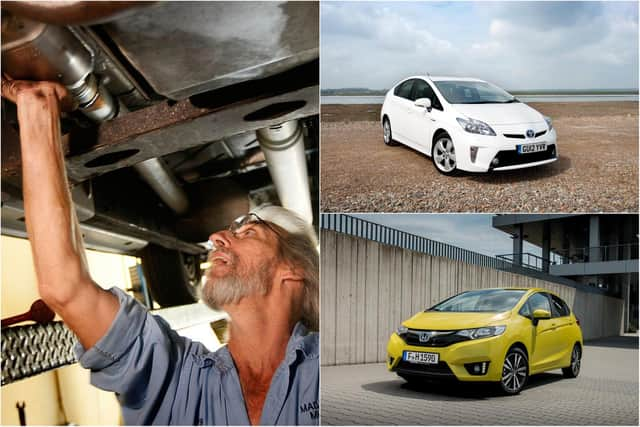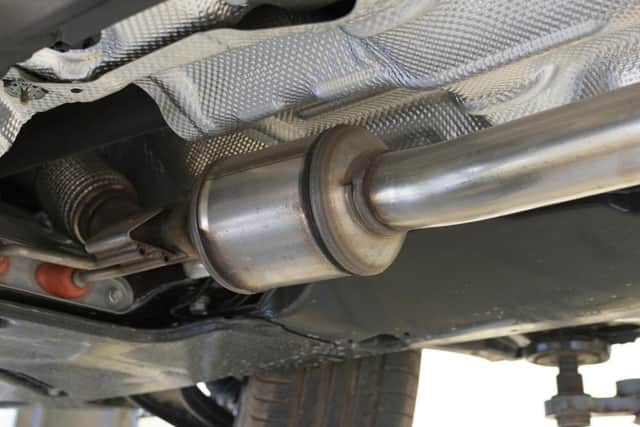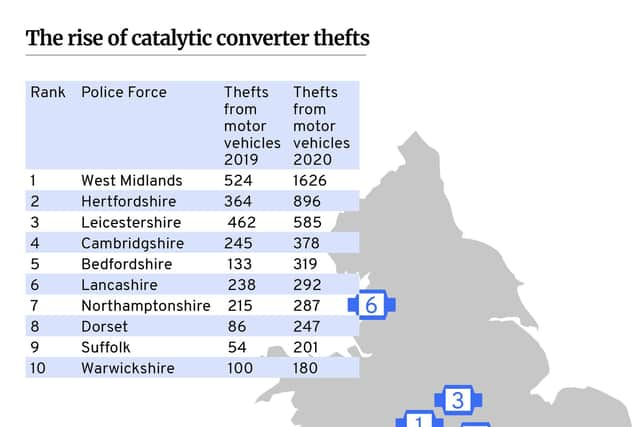Catalytic converter thefts double in lockdown: these are the most targeted models and the regions where you’re most at risk
and live on Freeview channel 276
Catalytic converter thefts have more than doubled in the last year, according to police data.
Figures obtained by consumer group Which? show a 104 per cent increase in thefts between 2019 and 2020, prompting calls for drivers to take action to protect their cars.
Advertisement
Hide AdAdvertisement
Hide AdThe figures from 25 forces in England, Wales and Northern Ireland are echoed by recent data compiled by the RAC and insurer Ageas, which showed that thefts of the critical component rose during lockdown. Claims submitted to Ageas for such crimes accounted for 30 per cent of all cases in 2020, compared with 20 per cent in 2019.


Catalytic converters, which filter pollutants from a vehicle’s exhaust gases are a prime target for thieves as they are relatively easy to remove and packed with precious metals which can be stripped and traded in. The converters feature a combination of platinum, palladium and rhodium, prices of which hit a record high earlier this year, up 200 per cent on March 2020.
However, the devices are expensive to replace and in some cases their theft can see a car declared an insurance write-off. The parts themselves can cost in excess of £1,000 and the AA has estimated that repairing the damage caused by their removal can cost up to £3,000.
The regions with the most catalytic converter thefts
The police figures showed that, predictably given its size, the majority of thefts occured in London. A total of 13,716 incidents were recorded in the capital in 2020, which police say makes it the global epicentre of catalytic converter theft.
Advertisement
Hide AdAdvertisement
Hide Ad

Behind it, West Midlands Police reported the second most cases, with 1,625 incidents, ahead of Hertfordshire (896) and Leicestershire (585).
The data also showed incidents were soaring in some force areas. North Wales police saw a 411 per cent rise in cases between 2019 and 2020, while Merseyside (295 per cent), Suffolk (272 per cent) and Norfolk (250 per cent) also saw significant rises. Only three forces – Cumbria, Humberside and Police Service of Northern Ireland – reported a reduction in cases, dropping between 20 and 59 per cent.
Separate data from Ageas showed that most thefts happened while cars were parked at home, either on the driveway or the road, although in a very small number of cases thieves were brazen enough to steal them in supermarket car parks while the driver was shopping.


The cars most likely to suffer catalytic converter theft
The new figures from Which? reflect recent data from Admiral Insurance showing the cars most likely to be targeted by thieves.
Advertisement
Hide AdAdvertisement
Hide AdWhich?’s figures show that the Toyota Prius, Toyota Auris and Honda Jazz are the most commonly targeted models, with Admiral also reporting many examples of the Lexus RX being singled out.
All of these models are hybrids, which are particular favoured by thieves as their converters don’t work as hard as in other vehicles and so the precious metals contained in them are less corroded.
How to protect your car from catalytic converter theft
Simon Williams from the RAC offers some simple advice on making your vehicle a less appealing target: “Most car crime takes place at night, so it makes sense to park a vehicle in a well-lit and residential location, or ideally in a garage if available. When away from home, look for car parks that have security patrols and are covered by CCTV.”
Police forces around the country have also issue further steps you can take, including:
Advertisement
Hide AdAdvertisement
Hide AdPark close to fences, walls or kerbs with the exhaust being closest to the barrier; this will make the theft more difficult
Avoid mounting your car on the kerb to park as it gives thieves easy access
If your catalytic converter is bolted on ask your local garage to weld the bolts to make it more difficult to remove
Consider a ‘cage clamp’ which locks around the converter or have the unit etched with a unique ID number
Speak to your car dealership about a tilt sensor that activates the alarm if someone tries to jack up your vehicle
If you see someone acting suspiciously under a vehicle, report it to the police
